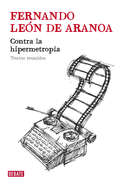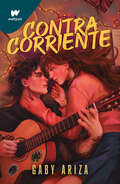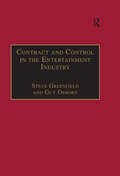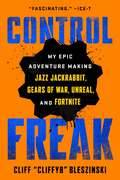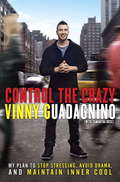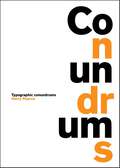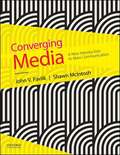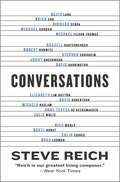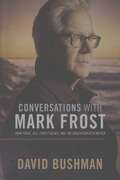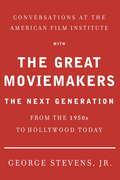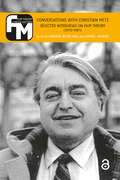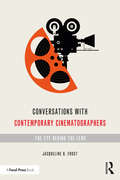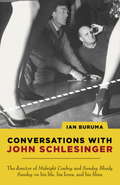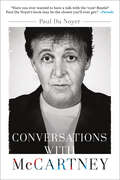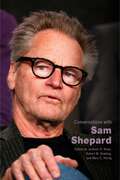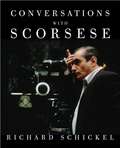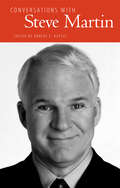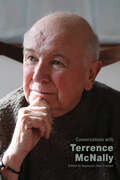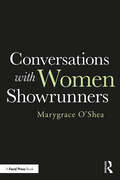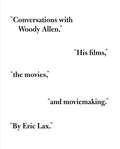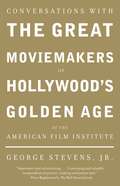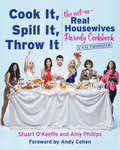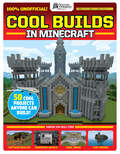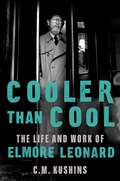- Table View
- List View
Contra la hipermetropía: Textos reunidos
by Fernando LeónAntología de los mejores textos de Fernando León Fernando León de Aranoa ha protagonizado una de las trayectorias más exitosas del reciente cine español. Su mirada personal y el trazo humano que caracteriza sus películas han conectado con un amplio público que se identifica con el cine que huye de los grandes escenarios y se declara resueltamente en contra de la hipermetropía. En este libro se recogen textos vinculados directamente con las películas de Fernando León, escritos de muy diversa índole, de su visión del oficio de cineasta, de sus películas favoritas, de temas que le han interesado, y una escueta selección de relatos breves. Pero todos reflejan su peculiar mirada y la impronta de su singular pincelada, y ayudan a desentrañar las claves de uno de los directores más interesantes del cine español.
Contracorriente
by Gaby ArizaUn amor único e inolvidable, una cuenta regresiva y un destino que desafía todas las probabilidades. Maju debe dejar atrás todo lo que conoce y viajar a otro país para terminar sus estudios. Al llegar a su nuevo hogar se encuentra con una ciudad llena de vida, amigos nuevos y... el enigmático cantante y guitarrista de la banda Indie Gentes, que además es su compañero de curso. Santi es distante y reservado. No parece encajar en ningún lado. La música es su único refugio. Pero la conexión con Maju es instantánea y entre ellos nace un amor apasionado que empieza a desarmar los muros que lo protegían. Solo hay un problema: Maju tiene planeado continuar su viaje cuando termine el colegio y Santi va a quedarse en su ciudad para intentar triunfar con la música. ¿Serán capaces de amar a contracorriente? Los lectores dicen:«Esta historia es ese lugar feliz al que me gusta volver una y otra vez. Santi y Maju tienen un lugar muy especial en mi corazón». «La amé, sentí todos y cada uno de los momentos como si fuesen míos». «Maravillosamente real».«Este libro me hizo sentir que pertenezco a algún lugar». «Es uno de los libros más lindos que he leído, lo amo».
Contract and Control in the Entertainment Industry: Dancing on the Edge of Heaven (Studies in Modern Law and Policy)
by Steve Greenfield Guy OsbornThis book examines the contractual relationships of creative artists within a number of areas of the entertainment industry. Whilst it focuses specifically on football, cricket, boxing and music, developments within other parts of the entertainment business are observed. The book also charts the concessions (artistic, professional and personal) that are often made by such artists in an attempt to achieve success and the consequent legal problems that may arise from their working relationships. Embracing historical materials and current legal practices, Contract and Control in the Entertainment Industry will be of interest to academics and students in the fields of law, sociology and cultural studies. It will also appeal to anyone who is interested in seeing how many areas of the entertainment industry have placed very restrictive contractual controls on the raw materials of the industry - the creative artists.
Control Freak: My Epic Adventure Making Video Games
by Cliff BleszinskiThe designer of Unreal and Gears of War offers an eye-opening personal account of the video game industry as it grew from niche hobby to hundred-billion-dollar enterprise.Video games are dominating the planet. In 2020, they brought in $180 billion dollars globally—nearly $34 billion in the United States alone. So who are the brilliant designers who create these stunning virtual worlds? Cliff Bleszinski—or CliffyB as he is known to gamers—is one of the few who&’ve reached mythical, rock star status. In Control Freak, he gives an unvarnished, all-access tour of the business. Toiling away in his bedroom, Bleszinski created and shipped his first game before graduating high school, and at just seventeen joined a fledgling company called Epic Games. He describes the grueling hours, obscene amounts of Mountain Dew and obsessive focus necessary to achieve his singular creative visions. He details Epic&’s rise to industry leader, thanks largely to his work on bestselling franchises Unreal and Gears of War (and, later, his input on a little game called Fortnite), as well as his own awkward ascent from shy, acne-riddled introvert to sports car-driving celebrity rubbing shoulders with Bill Gates. As he writes, &“No one is weirder than a nerd with money.&” While the book is laced with such self-deprecating humor, Bleszinski also bluntly addresses the challenges that have long-faced the gaming community, including sexism and a lack of representation among both designers and the characters they create. Control Freak is a hilarious, thoughtful, and inspiring memoir. Even if you don&’t play games, you&’ll walk away from this book recognizing them as a true art form and appreciating the genius of their creators.
Control the Crazy
by Samantha Rose Vinny GuadagninoWe all have the power to make our lives better in an instant. You have absolute power to control your crazy. In his new book, Vinny from Jersey Shore shares the step-by-step program that has helped him get a handle on his anxious mind and filled him with a sense of personal power and control that has rocked every facet of his life.
Conundrums: Typographic Conundrums
by Harry PearceConundrum is a mind-stretch. Encrypting idioms into their typographic equivalents, Harry enlivens our everyday language and challenges readers to see that "time after time after time" or, at least, "more often than not" "the writing is on the wall." For fans of word puzzles, sudoku, crosswords, and all manner of mind games, Conundrum offers an artfully packaged, cleverly designed new challenge. Drawing upon, literally in this case, graphic puzzles that he began creating as a child, Harry's developed over 100 witty conundrums for this book that will stretch the mind as well as delight the senses. A member of the Alliance Graphique Internationale, a frequent lecturer and contributor to design discourse, an internationally recognized leader in design, and a founder of Lippa Pearce, one of the UK's most respected design agencies, Harry refines the way we see and communicate. Conundrum achieves nothing less than changing how we understand and interact with language.
Converging Media
by John V. Pavlik Shawn McIntoshIndustry. Culture. Technology. It's time they came together. From reading news on tablets to video calling on smartphones, digital media has changed the ways in which we communicate. Placing convergence at the center of the discussion, Converging Media: A New Introduction to Mass Communication, Sixth Edition, uses the technologies we employ every day to explain our current media environment--and to consider where we might be headed.
Conversations
by Steve ReichA surprising, enlightening series of conversations that shed new light on the music and career of &“our greatest living composer&” (New York Times)Steve Reich is a living legend in the world of contemporary classical music. As a leader of the minimalist movement in the 1960s, his works have become central to the musical landscape worldwide, influencing generations of younger musicians, choreographers and visual artists. He has explored non-Western music and American vernacular music from jazz to rock, as well as groundbreaking music and video pieces. He toured the world with his own ensemble and his compositions are performed internationally by major orchestras and ensembles.Now Reich speaks with collaborators, fellow composers and musicians as well as visual artists influenced by his work to reflect on his prolific career as a composer as well as the music that inspired him and that has been inspired by him, including:David LangBrian EnoRichard SerraMichael GordonMichael Tilson ThomasRussell HartenbergerRobert HurwitzStephen SondheimJonny GreenwoodDavid HarringtonElizabeth Lim-DuttonDavid RobertsonMicaela HaslamAnne Teresa de KeersmaekerJulia WolfeNico MuhlyBeryl KorotColin CurrieBrad LubmanThrough this series of insightful, wide-ranging conversations starting from his student days to the present pandemic, we gain a compelling glimpse into the mind of &“the most original musical thinker of our time&” (The New Yorker).
Conversations With Mark Frost: Twin Peaks, Hill Street Blues, and the Education of a Writer
by David BushmanTwin Peaks co-creator Mark Frost dishes about his long and storied career, including his time as a stagehand at Mister Rogers' Neighborhood ; his early days as a a young bachelor in Hollywood rooming with Adam Arkin and Michael O'Keefe; his brief time at Universal TV before chucking it all away to return home to Minnesota to work on documentaries; his experiences in the infamous Hill Street Blues writing room with Steven Bochco and David Milch; and, finally, his career-defining collaboration with David Lynch on Twin Peaks.Mark Frost, cocreator of both the original Twin Peaks and The Return, is often lost in the shadow of co-creator David Lynch in the eyes of critics and scholars -- one newspaper even called him the "Other Peak." In fact, Frost played at least as crucial a role in developing the narrative, mythology, and aesthetic of what has come to be revered as one of the most artful and influential shows ever to air on television. This book, comprising a series of interviews with Frost over the course of a single year, finally and fully acknowledges the extent of Frost's contributions not only to those series, but also to American television in general, as a writer/producer on Hill Street Blues and other shows, and as a mentor to numerous other writers. The book traces the arc of his entire life and career, from his boyhood days in New York, Los Angeles, and Minneapolis, to his nascent playwriting career in Pittsburgh, to his days as a writer at Universal TV's famed factory of the seventies, to his work on Hill Street Blues alongside such industry titans as Steven Bochco and David Milch, to his multiple collaborations with the famously enigmatic Lynch, who perhaps emerges as slightly less enigmatic in the pages of this book. Conversations with Mark Frost deconstructs that legendary partnership, while at the same time exploring Frost's values, influences, thematic preoccupations, and approach to creating art -- for the screen, the stage, and the printed page -- as well as his thoughts about such topics as politics, extraterrestrial life, ethics, and the future of the human race.
Conversations at the American Film Institute with the Great Moviemakers
by George Stevens Jr.A companion volume to George Stevens, Jr.'s, much admired book of American Film Institute seminars with the great pioneering moviemakers ("Invaluable"--Martin Scorsese).Those represented here--directors, producers, writers, actors, cameramen, composers, editors--are men and women working in pictures, beginning in 1950, when the studio system was collapsing and people could no longer depend on, or were bound by, the structure of studio life to make movies. Here also are those who began to work long after the studio days were over--Robert Altman, David Lynch, Steven Spielberg, among them--who talk about how they came to make movies on their own. Some--like Peter Bogdanovich, Nora Ephron, Sydney Pollack, François Truffaut--talk about how they were influenced by the iconic pictures of the great pioneer filmmakers. Others talk about how they set out to forge their own paths--John Sayles, Roger Corman, George Lucas, et al. In this series of conversations held at the American Film Institute, all aspects of their work are discussed. Here is Arthur Penn, who began in the early 1950s in New York with live TV, directing people like Kim Stanley and such live shows as Playhouse 90, and on Broadway, directing Two for the Seesaw and The Miracle Worker, before going on to Hollywood and directing Mickey One and Bonnie and Clyde, among other pictures, talking about working within the system. ("When we finished Bonnie and Clyde," says Penn, "the film was characterized rather elegantly by one of the leading Warner executives as a 'piece of shit' . . . It wasn't until the picture had an identity and a life of its own that the studio acknowledged it was a legitimate child of the Warner Bros. operation.") Here in conversation is Sidney Poitier, who grew up on an island without paved roads, stores, or telephones, and who was later taught English without a Caribbean accent by a Jewish waiter, talking about working as a janitor at the American Negro Theater in exchange for acting lessons and about Hollywood: It "never really had much of a conscience . . . This town never was infected by that kind of goodness." Here, too, is Meryl Streep, America's premier actress, who began her career in Julia in 1977, and thirty odd years later, at sixty, was staring in The Iron Lady, defying all the rules about "term limits" and a filmmaking climate tyrannized by the male adolescent demographic . . . Streep on making her first picture, and how Jane Fonda took her under her wing ("That little line on the floor," Fonda warned Streep, "don't look at it, that's where your toes are supposed to be. And that's how you'll be in the movie. If they're not there, you won't be in the movie"). Streep on the characters she chooses to play: "I like to defend characters that would otherwise be misconstrued or misunderstood." The Next Generation is a fascinating revelation of the art of making pictures.
Conversations with Christian Metz: Selected Interviews on Film Theory (1970-1991) (Film Theory in Media History)
by Warren Buckland Daniel FairfaxFrom 1968 to 1991 the acclaimed film theorist Christian Metz wrote several remarkable books on film theory: Essais sur la signifi cation au cinéma, tome1 et 2; Langage et cinéma; Le signifiant imaginaire; and L'Enonciation impersonnelle. These books set the agenda of academic film studies during its formative period. Metz's ideas were taken up, digested, refined,reinterpreted, criticized and sometimes dismissed, but rarely ignored., This volume collects and translates into English for the first time a series of interviews with Metz, who offers readable summaries,elaborations, and explanations of his sometimes complex and demanding theories of film. He speaks informally of the most fundamental concepts that constitute the heart of film theory as an academic discipline — concepts borrowed from linguistics, semiotics, rhetoric, narratology, and psychoanalysis., Within the colloquial language of the interview, we witness Metz's initial formation and development of his film theory. The interviewers act as curious readers who pose probing questions to Metz about his books, and seek clarification and elaboration of his key concepts. We also discover the contents of his unpublished manuscript on jokes, his relation to Roland Barthes, and the social networks operative in the French intellectual community during the 1970s and 1980s.
Conversations with Contemporary Cinematographers: The Eye Behind the Lens
by Jacqueline B FrostPacked with gems of wisdom from the current 'masters of light’, this collection of conversations with twenty leading contemporary cinematographers provides invaluable insight into the art and craft of cinematography. Jacqueline Frost’s interviews provide unprecedented insight into the role as cinematographers discuss selecting projects, the conceptual and creative thinking that goes into devising a visual strategy, working with the script, collaborating with leading directors such as Martin Scorcese, Spike Lee, and Ava DuVernay, the impact of changing technology, and offer advice for aspiring cinematographers. Interviews include Maryse Alberti, John Bailey, Robert Elswit, Kirsten Johnson, Kira Kelly, Ellen Kuras, Edward Lachman, Matthew Libatique, John Lindley, Seamus McGarvey, Reed Morano, Polly Morgan, Rachel Morrison, Rodrigo Prieto, Cynthia Pusheck, Harris Savides, Nancy Schrieber, John Seale, Sandi Sissel, Dante Spinotti, Salvatore Totino, Amy Vincent and Mandy Walker. Filled with valuable information and advice for aspiring cinematographers, directors, and filmmakers, this is essential reading for anyone interested in the art and craft of cinematography.
Conversations with John Schlesinger
by Ian Buruma"I like the surprise of the curtain going up, revealing what's behind it." -John Schlesinger. The British director John Schlesinger was one of the cinema's most dynamic and influential artists. Now, in Conversations with John Schlesinger, acclaimed writer Ian Buruma, Schlesinger's nephew, reveals the director's private world in a series of in-depth interviews conducted in the later years of the director's life. Here they discuss the impact of Schlesinger's personal life on his art. As his films so readily demonstrate, Schlesinger is a wonderful storyteller, and he serves up fascinating and provocative recollections of growing up in a Jewish family during World War II, his sexual coming-of-age as a gay man in conformist 1950s England, his emergence as an artist in the "Swinging 60s," and the roller-coaster ride of his career as one of the most prominent Hollywood directors of his time. Schlesinger also discusses his artistic philosophy and approach to filmmaking, recounting stories from the sets of his masterpieces, including Midnight Cowboy; Sunday, Bloody Sunday; Marathon Man; and The Day of the Locust. He shares what it was like to direct such stars as Dustin Hoffman, John Voight, Sean Penn, Madonna, and Julie Christie (whom Schlesinger is credited with discovering) and offers his thoughts on the fickle nature of fame and success in Hollywood. Packed with wit and keen insight into the artistic mind, Conversations with John Schlesinger is not just the candid story of a dynamic and eventful life but the true measure of an extraordinary person.
Conversations with McCartney
by Paul Du NoyerThe intimate portrayal of one of the most famous men in music, more than half of which is in McCartney's own words. In June 1989, Paul Du Noyer was contacted by Paul McCartney's office in London. They asked him to interview the star; McCartney and Du Noyer had met once before and enjoyed a good rapport. In the years that followed, Paul Du Noyer continued to meet, interview and work for Paul McCartney on a regular basis, producing magazine articles, tour programs, album liner notes, press materials, and editorial content for McCartney's website. Du Noyer has spent more hours in formal, recorded conversation with McCartney than any other writer. Conversations with McCartney is the culmination of Du Noyer's long association with McCartney and his music. Drawing from their interview sessions across 35 years and coupling McCartney's own, candid thoughts with Du Noyer's observations and analysis, Conversations with McCartney is beautifully written--a sensitive, shrewd portrait of one of the most accomplished artists of our time.
Conversations with Sam Shepard (Literary Conversations Series)
by Jackson R. Bryer, Robert M. Dowling, and Mary C. HartigA prolific playwright, Sam Shepard (1943–2017) wrote fifty-six produced plays, for which he won many awards, including a Pulitzer Prize. He was also a compelling, Oscar-nominated film actor, appearing in scores of films. Shepard also published eight books of prose and poetry and was a director (directing the premiere productions of ten of his plays as well as two films); a musician (a drummer in three rock bands); a horseman; and a plain-spoken intellectual. The famously private Shepard gave a significant number of interviews over the course of his public life, and the interviewers who respected his boundaries found him to be generous with his time and forthcoming on a wide range of topics. The selected interviews in Conversations with Sam Shepard begin in 1969 when Shepard, already a multiple Obie winner, was twenty-six and end in 2016, eighteen months before his death from complications of ALS at age seventy-three. In the interim, the voice, the writer, and the man evolved, but there are themes that echo throughout these conversations: the indelibility of family; his respect for stage acting versus what he saw as far easier film acting; and the importance of music to his work. He also speaks candidly of his youth in California, his early days as a playwright in New York City, his professionally formative time in London, his interests and influences, the mythology of the American Dream, his own plays, and more. In Conversations with Sam Shepard, the playwright reveals himself in his own words.
Conversations with Scorsese
by Richard SchickelMean Streets, Taxi Driver, Raging Bull, The Last Temptation of Christ, Kundun, The Departed, The Aviator, Shutter Island: these are just a few of the critically acclaimed films, startling experimental works, and spectacular commercial blockbusters with which Martin Scorsese has forever enriched American cinema. Here is a rare and wonderfully insightful chance to experience all of these films, and the history and process of moviemaking in general, through the words and wit of the master director. Richard Schickel's canny and intelligent interviews guide us through Scorsese's life and work, from the child who escaped the realities of Little Italy in the 1950s through movies to the man whose increasingly encyclopedic knowledge of film shaped his ambitions and art. Scorsese reveals which films are most autobiographical and which have been forays into unknown territory in content or aesthetics. He talks about his lesser-known movies, those already considered classics, his documentaries, and his influences. He explains his personal style, the close attention he pays to detail, and his attraction to genre films. And he discusses what being a lifelong student of film has taught him about acting, directing, music, and camerawork, among many other topics. The result is a vivid, immensely enlightening history of modern Hollywood seen through the eyes of one intrepid filmmaker. We see audiences' expectations tested by what Scorsese was willing to put on the screen in explorations of prostitution, institutionalized violence, and religion. We see the unavoidable frustrations and exhilarating rewards of filming live concerts for The Band and at Woodstock. And we see many of the rewarding artistic and personal relationships of Scorsese's career, including collaborations with Robert De Niro, Harvey Keitel, Jack Nicholson, and Leonardo DiCaprio. An invaluable appreciation of one of our most admired film directors.
Conversations with Steve Martin (Literary Conversations Series)
by Robert E. KapsisConversations with Steve Martin presents a collection of interviews and profiles that focus on Martin as a writer, artist, and original thinker over the course of more than four decades in show business. While those less familiar with his full body of work may think of Martin as primarily the "wild and crazy guy" with an arrow through his head, this book makes the case that he is in fact one of our nation's most accomplished and varied artists. It shows the full range of Martin's creative work, tracing the source of his comic imagination from his early standup days, starting in the mid to late 1960s through the films he has written and starred in, and emphasizing his more recent creative outpourings as playwright, essayist, novelist, memoirist, songwriter, composer, musician, and art critic. “Standup is the hardest material in the world to write for someone else; it's like trying to condense 10 years of experience into 20 minutes of new material,” Martin says. But commenting on his fiction writing, he says. “I think you have to be able to find as a writer that state where you don't know what you're going to say or what the character is going to say or who the characters are. That's the biggest thrill of all. When you start to trust that subconscious thing and you don't censor yourself—just remember you can always throw it away that's when the good stuff comes out.” The selected materials consist not only of pieces focused primarily on Martin's writings, but also broader profiles and conversations that help explain Martin's development as a writer within the larger context of his many other accomplishments, talents, and performance skills.
Conversations with Terrence McNally (Literary Conversations Series)
by Raymond-Jean FrontainArriving in New York at the tail end of what has been termed the “Golden Age” of Broadway and the start of the Off-Broadway theater movement, Terrence McNally (1938–2020) first established himself as a dramatist of the absurd and a biting social critic. He quickly recognized, however, that one is more likely to change people’s minds by first changing their hearts, and—in outrageous farces like The Ritz and It’s Only a Play—began using humor more broadly to challenge social biases. By the mid-1980s, as the emerging AIDS pandemic called into question America’s treatment of persons isolated by suffering and sickness, he became the theater’s great poet of compassion, dramatizing the urgent need of human connection and the consequences when such connections do not take place. Conversations with Terrence McNally collects nineteen interviews with the celebrated playwright. In these interviews, one hears McNally reflect on theater as the most collaborative of the arts, the economic pressures that drive the theater industry, the unique values of music and dance, and the changes in American theater over McNally’s fifty-plus year career. The winner of four competitive Tony Awards as the author of the Best Play (Love! Valour! Compassion! and Master Class) and author of the book for the Best Musical (Kiss of the Spider Woman and Ragtime), McNally holds the distinction of being one of the few writers for the American theater who excelled in straight drama as well as musical comedy. In addition, his canon extends to opera; his collaboration with composer Jake Heggie, Dead Man Walking, has proven the most successful new American opera of the last twenty-five years.
Conversations with Women Showrunners
by Marygrace O'SheaFeaturing over forty interviews with America’s leading showrunners, this book provides unique perspectives and insights into the TV industry, demystifying the craft, backbone, skill, strategies, challenges, and persistence it takes to succeed in Hollywood and internationally. Marygrace O’Shea’s conversations with women showrunners are part master craft lesson, part backstage pass, part career guide from the geniuses who create the best TV. The book shines a light on what it truly means to be a showrunner working in the industry today, and reveals how to navigate a career and a future in the global marketplace. Interviews include Angela Kang (The Walking Dead), Aline Brosh McKenna (Crazy Ex-Girlfriend), Barbara Hall (Madam Secretary), Charlotte Brown (Rhoda), Chris Nee (Doc McStuffins), Elizabeth Berger (This is Us), Gloria Calderón Kellett (One Day at a Time), Ilene Chaiken (The L Word), Liz Meriwether (The New Girl, The Dropout), Liz Tigelaar (Tiny Beautiful Things, Little Fires Everywhere), Marta Kauffman (Friends, Grace and Frankie), Tracy Oliver (Harlem, Awkward Black Girl), Sierra Teller Ornelas (Rutherford Falls), and many more. Ideal for professional and aspiring television writers, as well as students of screenwriting, film and TV, this book is essential reading for anyone interested in the art, craft and business of creating television.
Conversations with Woody Allen
by Eric LaxFrom the author of the best-selling biography Woody Allen--the most informative, revealing, and entertaining conversations from his thirty-six years of interviewing the great comedian and filmmaker.For more than three decades, Woody Allen has been talking regularly and candidly with Eric Lax, and has given him singular and unfettered access to his film sets, his editing room, and his thoughts and observations. In discussions that begin in 1971 and continue into 2007, Allen discusses every facet of moviemaking through the prism of his own films and the work of directors he admires. In doing so, he reveals an artist's development over the course of his career to date, from joke writer to standup comedian to world-acclaimed filmmaker.Woody talks about the seeds of his ideas and the writing of his screenplays; about casting and acting, shooting and directing, editing and scoring. He tells how he reworks screenplays even while filming them. He describes the problems he has had casting American men, and he explains why he admires the acting of (among many others) Alan Alda, Marlon Brando, Michael Caine, John Cusack, Judy Davis, Robert De Niro, Leonardo DiCaprio, Mia Farrow, Gene Hackman, Scarlett Johansson, Julie Kavner, Liam Neeson, Jack Nicholson, Charlize Theron, Tracey Ullman, Sam Waterston, and Dianne Wiest. He places Diane Keaton second only to Judy Holliday in the pantheon of great screen comediennes.He discusses his favorite films (Citizen Kane is the lone American movie on his list of sixteen "best films ever made"; Duck Soup and Airplane! are two of his preferred "comedian's films"; Trouble in Paradise and Born Yesterday among his favorite "talking plot comedies"). He describes himself as a boy in Brooklyn enthralled by the joke-laden movies of Bob Hope and the sophisticated film stories of Manhattan. As a director, he tells us what he appreciates about Bergman, De Sica, Fellini, Welles, Kurosawa, John Huston, and Jean Renoir. Throughout he shows himself to be thoughtful, honest, self-deprecating, witty, and often hilarious.Conversations with Woody Allen is essential reading for everyone interested in the art of moviemaking and for everyone who has enjoyed the films of Woody Allen.From the Hardcover edition.
Conversations with the Great Moviemakers of Hollywood's Golden Age: At the American Film Institute
by George Stevens Jr.The first book to bring together these interviews of master moviemakers from the American Film Institute's renowned seminars,Conversations with the Great Moviemakers offers an unmatched history of American cinema in the words of its greatest practitioners. Here are the incomparable directors Frank Capra, Elia Kazan, King Vidor, David Lean, Fritz Lang ("I learned only from bad films"), William Wyler, and George Stevens; renowned producers and cinematographers; celebrated screenwriters Ray Bradbury and Ernest Lehman; as well as the immortal Ingmar Bergman and Federico Fellini ("Making a movie is a mathematical operation. It's absolutely impossible to improvise"). Taken together, these conversations offer uniquely intimate access to the thinking, the wisdom, and the genius of cinema's most talented pioneers.
Cook It, Spill It, Throw It: The Not-So-Real Housewives Parody Cookbook
by Stuart O'Keeffe Amy PhillipsCelebrity chef Stuart O'Keeffe and comedian Amy Phillips razz the Real Housewives in this gorgeous cookbook filled with recipes inspired by iconic moments in the franchise’s rich history. With a foreword by Andy Cohen.“Cook It, Spill It, Throw It is an immersive, one-of-a-kind experience in a world we can’t escape (but let’s face it, we don’t want to!).” —from the foreword by Andy CohenTrends come and go, but watching rich women drink and catfight is forever. Which is why after more than a decade of airing, the Real Housewives phenomenon continues to reign supreme in the pop culture stratosphere. Week after week, season after season, loyal fans watch the thrilling drama—the backstabbing, the gossiping, the screaming, the table flipping, the wine tossing—unfold. Cook It, Spill It, Throw It is a cookbook created specifically for Housewives fans. Chef Stuart O’Keeffe and comedian Amy Phillips—long-time devotees themselves—have dreamed up an inviting menu served with a side of delicious snark.Inspired by the series and its stars, the dishes and drinks evoke familiar moments of chaos from the franchise. Whether you’re looking to make Ponytail Pulled Pork, or you want to comfort a friend in the Caicos with Eggs a Lu’Francais, there’s a meal for you—and there are definitely plenty of drinks (including Henny-thing Can Happen and the classic Singer Stinger Sipper).Featuring gorgeous original photography and equally gorgeous recipes, Cook It, Spill It, Throw It is the must-have cookbook and companion for every Housewives addict.
Cool Builds in Minecraft!: An AFK Book (GamesMaster Presents)
by Future Future PublishingGet building today! This book is full of cool Minecraft projects and awesome advice that will help you become a master builder in no time.Get building today! For those who want to master the most important and most challenging aspect of Minecraft, GamesMaster Presents: Cool Builds in Minecraft! is the definitive book out there that covers mining resources to crafting buildings, vehicles and even entire worlds. Perfect for players of all ages who want to improve their crafting skills, this book will take you all the way from crafting your first shelter, to putting the finishing touches to your very own mega-build masterclasses. Includes full-color images and step-by-step instructions for 50 cool Minecraft builds. 100% unofficial. Created by Future plc and GamesMaster, leaders in video game publishing.
Cool Daddy Rat
by Kristyn CrowEvery night, Cool Daddy Rat takes his bass case and goes out to play jazz and scat around the city. But one night he hears something strange: Peeky squeaky who dat? It's his son, Ace, hiding in the bass case! After a reassuring call to Mama, the pair go all over the city together, filling the streets with his sweet beat. And when Ace can't contain himself any longer, Cool Daddy Rat finds out he's the best scatter in the family. Image descriptions present.
Cooler Than Cool: The Life and Work of Elmore Leonard
by C. M. KushinsDrawing on unprecedented archival and family access, Cooler Than Cool: The Life of Elmore Leonard, is the first comprehensive biography of the master American crime writer, author of witty, gritty bestsellers like Get Shorty and Raylan.Over the course of his sixty-year career, Elmore Leonard, “the Dickens of Detroit,” published forty-five novels that have had enduring appeal to readers around the world. Revered by Martin Amis, Margaret Atwood, Raymond Carver, and Stephen King, his books were innovative in their blending of a Hemingway-inspired noirish minimalism and a masterful use of realistic dialogue over exposition—a direct evolution spurred by his years as a screenwriter.Leonard’s fiction contained many layers, and at the heart of his work were progressive themes, stemming from his years as a student of the Jesuit religious order, his personal beliefs in social justice, and his successful battle over alcoholism. He drew inspiration from greats like Raymond Chandler and Dashiell Hammett, but the true motivation and brilliance behind his crime writing was the ongoing class struggle to achieve the American Dream—often seen through the eyes of law enforcement officers and the criminals they vowed to apprehend.C. M. Kushins tells Leonard’s full life story against recurring themes and evolving storytelling methods of his work, drawing on interviews with primary sources ranging from Leonard’s family and friends to those who acted in, produced, and directed his work onscreen. He also includes never-before-published excerpts from Leonard’s unfinished final novel and planned memoir. Definitive and revealing, Cooler Than Cool shows Leonard emerging as one of the last writers of the “pulp fiction” era of midcentury America, to ultimately become one of the most successful storytellers of the twentieth century, whose influence continues to have far-reaching effects on both contemporary crime fiction and American filmmaking.
